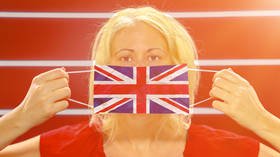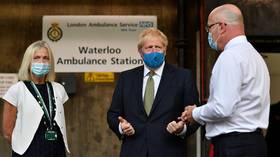Making the wearing of face masks compulsory is inconsistent, illogical, illiberal & divisive

The UK government’s U-turn in mandating the wearing of face masks – which provide moderate protection at best – in shops and on public transport is another epic fail in Boris Johnson’s handling of the Covid-19 crisis.
Boris Johnson's government in Westminster has performed a sharp U-turn and announced that wearing face masks will now be compulsory in shops in England from July 27. While there is some evidence of a moderate protective effect from wearing masks, the whole affair says more about the chaos inside the cabinet than it does about the merits of face masks. Worse, the leap from mild advice to legal compulsion shows how little regard the UK government now has for freedom.
Back in the early days of the pandemic, the UK governments – both in Westminster and the devolved governments in Scotland, Wales and Northern Ireland – took their lead from the World Health Organisation when it came to face masks. Reviews of randomised controlled trials on the use of face masks – the “gold standard” of medical evidence – seemed to indicate little benefit. In short, we were told, they were pretty much useless. Other things, like isolating if we had possible symptoms, washing our hands and making sure we sneezed into tissues or our elbows were far more important, we were told.
Some countries, particularly in East Asia along with central and eastern Europe, took a different approach and quickly made face masks mandatory. Those countries do seem to have had better outcomes in relation to Covid-19. But those countries were also different in lots of other ways from countries like the UK, France and the US that have fared less well.
For example, acting quickly to implement social distancing measures seems to have been very important in keeping case numbers down. What governments did seems less important, perhaps, than how quickly they did it. What difference face masks made is unclear.
As the pandemic has gone on, real-world data has been gathered that suggests that areas that made face masks mandatory have done better than those that did not. Another aspect is that numerous researchers have now concluded that transmission could take place through aerosols – very fine droplets that linger in the air rather than falling to the ground. And there is the recognition that people who are infected but have no noticeable symptoms could be spreading infection without realising it.
Some scientists have concluded that the evidence is now compelling for wearing face masks, while others believe the evidence is still weak. Some worry that using face masks could make us complacent about other things we should do, like washing our hands, or that by fiddling with soggy masks we may end up transmitting infection via our hands. The fact that the debate is still going on suggests the impact of face masks is likely to be small, but it is nonetheless a good thing to question our prior assumptions. That is what science is all about.
Also on rt.com ‘Absolutely absurd’: London Met Police slam UK govt’s Covid-19 face mask plans as ‘impossible’ to enforceHowever, the UK government's shift is remarkable – and laughable. Wearing face masks on public transport was made compulsory on June 15, and the announcement explained the government's thinking:
“When necessary to use public transport, people may be more likely to be in enclosed spaces for longer periods of time where we know there is a greater risk of the spread of the virus and social distancing is likely to be difficult to follow consistently. This differs from enclosed spaces like shops, for example, where people can more easily go outside if social distancing is not possible and where shop owners can place limits on the number of customers allowed inside at any one time.”
Nonetheless, despite no great change in the evidence and with deaths from Covid-19 falling to zero on many days – by Tuesday this week there had been six consecutive days without any deaths – the Scottish government made face masks mandatory in shops from last Friday, July 10. Fewer than one in 10,000 people in Scotland have tested positive in recent weeks. When normality should be returning, another barrier to social interaction was being imposed for no good reason.
This piled further pressure on the government in Westminster to follow suit. But even last weekend, senior ministers were suggesting mandatory masks were unnecessary. Michael Gove – Johnson's deputy in all but name – said on Sunday: “I don't think mandatory, no, but I would encourage people to wear face masks when they are inside, in an environment where they are likely to be mixing with others and where the ventilation may not be as good as it might. I think that it is basic good manners, courtesy and consideration, to wear a face mask if you are, for example, in a shop.”
The fact that compulsion is now deemed necessary – and not even now, but in 13 days time, bizarrely – has little or nothing to do with science. Rather, it reveals that the UK government has lost the plot, unable to offer any principled reasons for its actions, and is simply making it up as it goes along in response to the noise from public-health lobbyists or social media.
Politicians have even claimed that by wearing masks we will encourage fearful consumers to come out and start spending money. But the opposite idea could also be true, that routine mask-wearing is a constant reminder that there's a disease going around. Many people may find that going to a shop isn't worth the hassle and just order online.
If the government had launched a public campaign to encourage us to wear face masks, making a strong argument in favour using the best available evidence, that might have made sense. If such a drive failed and the government believed that mask-wearing was an urgent priority, threatening non-wearers with fines might make sense. But such a campaign has never been tried – presumably because the evidence is really not very convincing yet.
Instead, we are now being threatened with police action and fines for non-compliance. It's no surprise that Scotland's First Minister Nicola Sturgeon is keen to keep up restrictions. She has little love of liberty. But this latest policy in Westminster surely puts paid to the idea that Boris Johnson has deeply-held libertarian instincts.
Nobody is going to go to the barricades over being made to wear a face mask. For most people, it is a minor inconvenience and most of us want to do the “right thing” – or at least, want to be seen to be doing the right thing. But yet another small attack on our liberty, for no good purpose, has further reinforced a new “culture war” emerging around the pandemic, between those who feel that Covid-19 is being used to foist restrictions upon us and those who believe anyone not wearing a face mask is basically a murderer.
In short, Boris Johnson's face masks policy is inconsistent, illogical, illiberal and divisive. For even his erstwhile supporters, his reputation has nose-dived even further.
Think your friends would be interested? Share this story!
The statements, views and opinions expressed in this column are solely those of the author and do not necessarily represent those of RT.
















